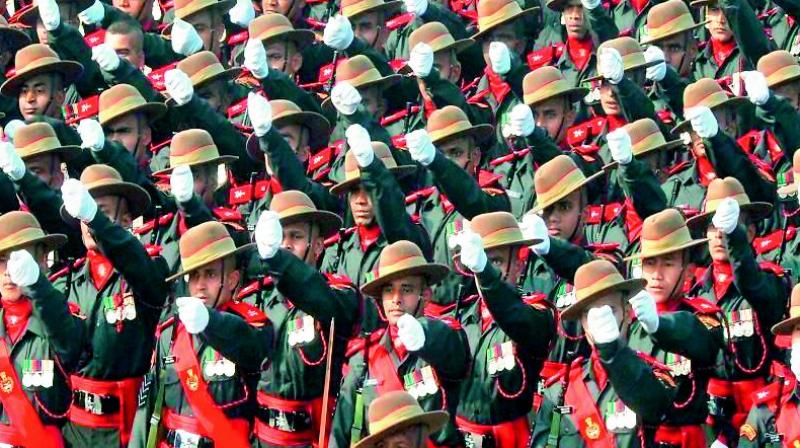Line of duty: Free rations necessary

The axiom that an Army marches on its stomach is as good today as it ever was. So the 7th Pay Panel’s recommendation that entitled rations of military officers in peace areas should be scrapped and they should be paid in cash instead, has predictably proved unsettling. The ration allowance given in lieu of actual ration items, implemented from July 1 this year, has not gone down well with the officers; in fact, it has created widespread anguish and resentment. Military officers feel this is yet another demoralising step taken by the government after its many unsympathetic decisions, including bringing down their status vis-a-vis the Civil Services. A serving senior Army officer has given notice to the Central government to reverse its decision within 60 days or face legal action. He has made the Defence Secretary a respondent.
Ration scales of armed forces officers were initially formulated during the Second World War, and reviewed from time to time, keeping in mind the terrain, weather conditions and desired requirement of calories, nutrients and physiological needs of the personnel. After the 1971 Indo-Pak war, the Army proposed extending the provision of supplying rations to officers deployed in peace areas as was being done in Field Areas. This was because rations were often unavailable or difficult to procure by individual officers posted in small towns where Army cantonments are mostly located. The efforts and perseverance of the late General K.V. Krishna Rao and his predecessors in this matter paid off and the government conceded to the request from January 26, 1983.
However, the 7th Pay Commission, instead of going into the reasons why rations to officers deployed in peace areas was introduced 35 years ago, and analysing whether those reasons hold good today, made its recommendation to scrap the ration entitlement on irrational grounds. The Central Pay Commission (CPC) recommended scrapping many allowances entitled to Central Government employees sporadically, so that the services of the government employees deployed in provisioning these allowances can be gainfully employed on productive issues. Unfortunately, the CPC found that rations to military officers was one of the sporadically entitled allowances and scrapped the entitlement. The fact is that it is an entitlement for 43,000 officers of the Army, Air Force and Navy deployed across the length and breadth of the country. Scrapping it has not done away with any staff, as the same staff continues provisioning of rations to the rest of the 14 lakh military personnel, including officers, posted in field areas.
Clearly, the 7th CPC has not consulted Service HQ and has not taken a rational view of the issue. Some reports appearing in the media suggest that the 7th CPC scrapped free rations based on a CAG (Comptroller and Auditor General) report that indicated procedural irregularities. But this is untrue because there is no separate procedure for procurement of officers’ rations, and the total cost of officers’ rations is around three per cent of the total cost of military rations. The 7th CPC has ignored the greater relevancy of rations to military officers in the present context, who are frequently deployed at short notice for internal security duties. When Parliament was attacked by terrorists in December 2001, the entire Army deployed in peace areas moved to remote areas near the border at a few hours’ notice and remained there for long duration. Imagine if officers’ rations were not provided how much the military would have suffered.
The ration entitlement of officers is based on nutritional and calorie requirements. The meat and vegetables required to be consumed is in-built into the rations supplied, so officers don’t have to struggle to work out their daily diet requirements. Finding unadulterated and hygienic produce and special items in small towns and markets is not easy. The ration allowance offered now is apparently based on bulk procurement prices by the Defence Ministry, and not on retail rates at which these items would be available in small towns. The ration allowance offered presently is '96 per day, which is peanuts, as the actual cost would be around Rs 250 per day. Geographical location can also impact the rates. It is honour, value system and selfless service that make the armed forces different from the bureaucracy and other government services. Efficient logistic back-up by government enhances the morale of the armed forces and makes them better in discharging their duties. The government should set aside ego issues and realise the adverse implications of its decision. It should concede to the genuine demand of officers and reverse its decision sooner rather than later.

